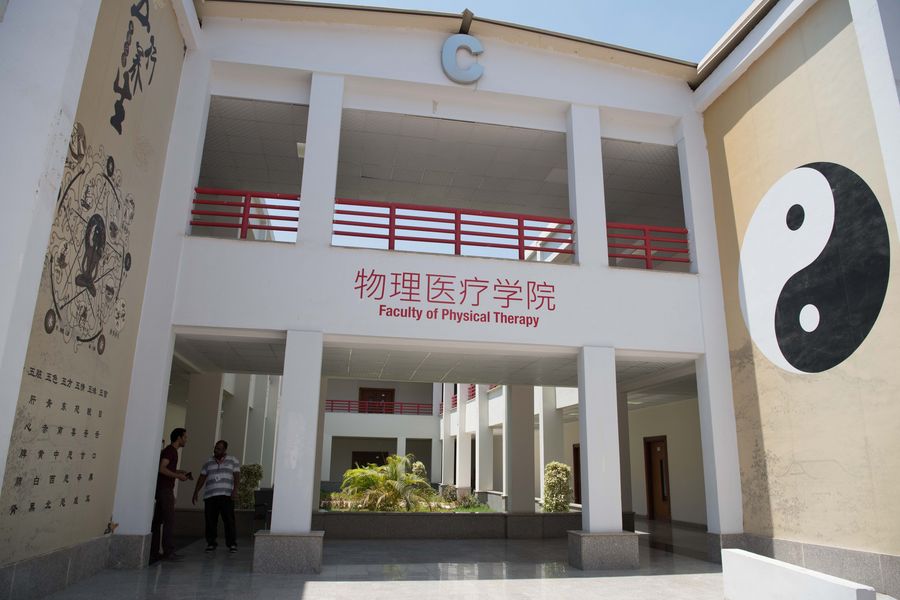
The Faculty of Physical Therapy of the Egyptian Chinese University in Cairo, Egypt. (Xinhua/Wu Huiwo)

The Egyptian Chinese University president and Egypt's former higher education minister Ashraf el-Shihy speaks during an interview in Cairo, Egypt on Aug. 4, 2019. (Xinhua/Wu Huiwo)
Learning without specific textbooks? Yes! In the Egyptian Chinese University in Cairo, students get their knowledge from the lectures and digital library as an international standard for education.
by Mahmoud Fouly
CAIRO, Sept. 9 (Xinhua) -- Sitting on a vast area of land with several premises in the Egyptian capital Cairo, the Egyptian Chinese University (ECU), which recently opened its gates for students for the fourth year, adds a new aspect to the deepening cooperation between Egypt and China.
Being the first and only one of its kind in Egypt, or in Africa and the Middle East, the ECU has four faculties so far: engineering and technology, economics and international trade, physical therapy, and pharmacy and medical technology.
It has provided educational services to about 2,500 students so far.
The ECU is not a traditional university with specific textbooks, but it teaches students to get their knowledge from the lectures and the reference materials available in the digital library as an international standard for education, preparing them for post-graduate self-learning that is necessary for the labor market.
"The university deepens the Egypt-China cooperation and enhances learning from the Chinese experience in the fields of education and scientific research," Ashraf el-Shihy, the ECU president and Egypt's former higher education minister, told Xinhua at his office in the ECU.
He stressed that the university also seeks to serve as "a center for promoting the Chinese culture in Egypt."
The ECU started operation with the faculty of engineering in 2016. The faculties of physical therapy and economics started in 2017. Next year, the faculty of pharmacy will be opened as the fourth faculty in the university.
Besides the main classrooms, the building of the Engineering College, the oldest in the university, has several laboratories for physics, mechatronics, signal systems and digital design, pneumatic and hydraulic control, surveying, fluid mechanics and many others.
The second floor has a computer-equipped classroom for smart education with a large monitor, granted as a gift from China's giant electronics company Haier.
"Our faculty is growing popular among Egyptian students because China is known for its very advanced modern technologies and due to our cooperation with relevant Chinese universities," said Iman al-Azizy, dean of the faculty of engineering.
The ECU's faculty of engineering has five departments: construction and building, software and information technology, energy and renewable energy, mechatronics, and petroleum and gas.
The dean pointed out that the ECU has a protocol of cooperation with Beijing Jiaotong University in software engineering technology and is trying to have another in construction and building engineering.
"Since China is very advanced in technology, our future graduates will be distinguished enough to find job opportunities in the labor market, bearing in mind the growing number of Chinese companies operating in Egypt," Azizy told Xinhua.
The ECU students of software engineering have a chance to study in China for two years and complete their studies here in Egypt to graduate with double degrees. The university also sends students to China for summer training courses in software engineering.
Salah-Eddin Mohamed, a junior engineering student at the ECU, said that the university provides a good environment for excellent learning, as the number of students is not too many and the professors are so renowned and helpful.
"China is a big country in terms of industry and technology. So, a joint Egyptian-Chinese university sponsored by China is an excellent chance for me as a student to join," the engineering student told Xinhua, hoping to get the university's scholarship to study in China.
ECU students are also taught the Chinese language as part of their studies, providing future graduates with better job opportunities at the Chinese companies operating in Egypt.
The building of the faculty of physical therapy inside the ECU has a large painting on a front wall with Chinese characters showing a diagram illustrating the five elements of health in the Chinese culture, which are water, earth, fire, wood and metal.
The painted illustration highlights the interrelations between nature and human health as well as the relations between different body organs.
Noha al-Serty, professor of physical therapy at the ECU, said the university is distinguished by combining the Western methods of physical therapy and the traditional Chinese medicine, which is not found in any other faculty of physical therapy in Egypt.
"We have cooperation deals with Chinese universities for exchanging students and professors, such as Shanghai Jiao Tong University, to boost the expertise of both students and professors alike," the professor told Xinhua.
She added that the ECU is seeking to increase its cooperation with Chinese universities to make its future graduates more distinguished than those of other faculties of physical therapy.
For her part, Kholoud Walid, a physical therapy student, said that she applied to join the ECU's faculty of physical therapy because she always wanted to be a physician, referring to China as the best in physical therapy, "which is a plus for our faculty of physical therapy."
"When I came here I liked everything about the university. I am a junior student but in the coming years we will learn more about the Chinese style of physical therapy including the traditional Chinese medicine and acupuncture," Walid told Xinhua.



